1.What are “hogoshi”?
Hogoshi, or Volunteer Probation Officers, are community volunteers who support the rehabilitation and reintegration of probationers and parolees (hereinafter referred to as “clients”) and carry out crime prevention activities. In Japan, supervision is the responsibility of professional probation officers (PPOs), and hogoshi support these efforts of PPOs by conducting activities such as meeting with and advising clients. In addition, hogoshi are also engaged in building a safe and secure society through organizing a movement to develop public understanding of the importance of offender reintegration and crime prevention.
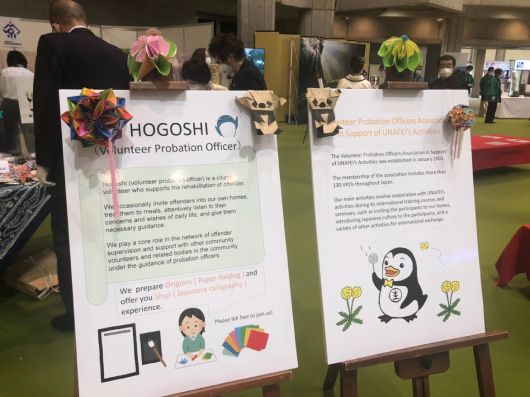
The mission of hogoshi is provided by the Hogoshi Act:
In the spirit of volunteer social service, the mission of all hogoshi (volunteer probation officers) is to assist persons who have committed crimes and juvenile delinquents to improve and rehabilitate themselves, and to enlighten the public on crime prevention, thereby enhancing the local community and contributing to the welfare of both individuals and the public (Hogoshi Act, Art. 1).
Hogoshi are commissioned by the Minister of Justice and are given legal status as part-time government officials based on the Hogoshi Act.
Despite these characteristics, rather than as representatives of the government, hogoshi support clients as a neighbor in the community. This enables hogoshi to support clients even after the termination of probation or parole period. Although hogoshi are not paid salaries, the government pays all or part of the expenses incurred in discharging their duties, such as transportation, communication expenses, etc.
2.Main duties of hogoshi
A.Support of rehabilitation and reintegration
Hogoshi interview clients regularly, guide them so that they can comply with the conditions for their rehabilitation, and provide advice to help them live their daily lives, find and continue employment, or remain in school.
B.Re-entry Coordination for inmates
To facilitate a smooth transition and reintegration into the community from correctional facilities, hogoshi meet with inmates’ families or guarantors to confirm whether they will accept the inmates when they are discharged. Sometimes hogoshi coordinate family relationships, residence and job placement. Hogoshi also write letters to inmates or visit them in correctional facilities to provide consultation for their plan for rehabilitation in the community when they are discharged.
C.Promoting crime prevention activities in the community
Crime prevention activities are carried out by hogoshi to build a safe and secure society. These activities, known as the Yellow Feather Campaign, are conducted in order to foster a general awareness of the significance of social inclusion and crime prevention. Collaborating with other organizations and volunteer groups, hogoshi conduct various activities such as advertising the campaign, crime prevention meetings for residents of their communities, holding open seminars on the harms of drug abuse, and so on.
3.Recruitment of hogoshi
The following conditions stated in Art. 3 of the Hogoshi Act are required for hogoshi to be commissioned:
- Evaluated highly with respect to their character and conduct in the community;
- Enthusiastic and sufficiently available to work;
- Financially stable; and
- Healthy and active.
To recruit hogoshi, the directors of the probation offices prepare lists of candidates and seek the advice of the Hogoshi Screening Commission, which is an advisory committee to the director of the corresponding probation office. The Minister of Justice then appoints those who pass the screening process as hogoshi, although the total number cannot exceed 52,500 throughout the country (Art. 2-2, Hogoshi Act). After recruitment, hogoshi are entitled to serve for two years, but they can be reappointed until they reach retirement age of 78 years old.
4.About us: The Japan Hogoshi Federation
The Japan Hogoshi Federation is a nationwide organization, and its mission is to contribute to building a safe and secure society by providing hogoshi and their organizations with liaison, coordination and assistance services. In Japan, there are approximately 47,000 hogoshi, and they are assigned to one of 886 probation districts in which they reside. In addition, we have local, prefectural and regional level associations so as to enhance the activities of hogoshi.
Each probation district has a local hogoshi’ association, and these local associations are directed to establish hogoshi associations at the prefectural level. The prefectural associations organize the eight regional federations of hogoshi. Finally, at the state level, the Japan Hogoshi Federation is organized as a juridical person for offender rehabilitation based on the provisions of the Offenders Rehabilitation Services Act.
The Japan Hogoshi Federation was established in July 1950, and was called The National Federation of Volunteer Probation Officers; however, in March 2022, the name was changed to the Japan Hogoshi Federation.
5.Establishing the international “Hogoshi Day”
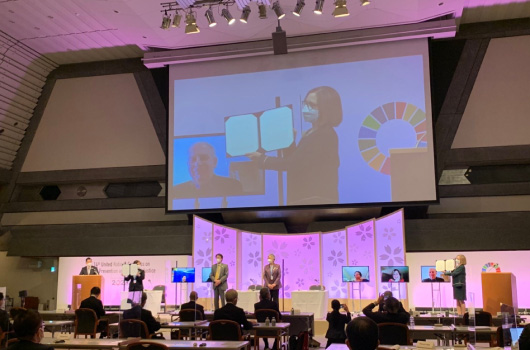
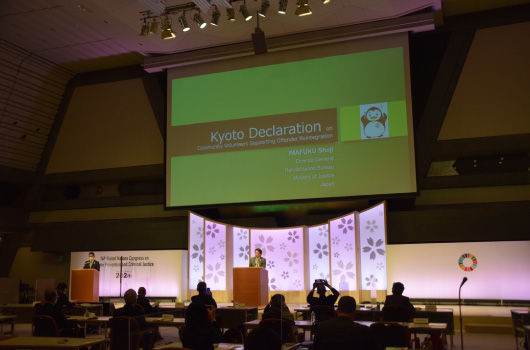
It must be a common wish for people all over the world to build a secure and safe community. Convinced that our activities can provide valuable insights to every society and any people, we have been promoting the concept of hogoshi and disseminating hogoshi practices internationally.
In July 2014, the Asia Volunteer Probation Officers Meeting was held in Tokyo as the first international meeting for community volunteers supporting offender rehabilitation with the participants from Korea, the Philippines, Singapore, Thailand and Japan, as well as observers from Kenya and China. At that meeting, recognizing the importance of volunteers activities, the “Tokyo Declaration of the Asia Volunteer Probation Officers Meeting” was adopted, which called for the establishment of a global network of community volunteers supporting offender rehabilitation and their continued mutual cooperation. The meeting was succeeded by the 2nd Asia Volunteer Probation Officers Meeting in September 2017, and discussions were held to consider how public awareness of the importance of the engagement of community volunteers in offender reintegration, such as hogoshi in Japan, could be enhanced.
Based on these meetings, the World Congress for Community Volunteers Supporting Offender Reintegration took place as an ancillary meeting of the 14th United Nations Congress on Crime Prevention and Criminal Justice (the “Kyoto Congress”) on March 7, 2021. Attended by many practitioners in the field of offender reintegration from all over the world, the “Kyoto Declaration on Community Volunteers Supporting Offender Reintegration (Kyoto Hogoshi Declaration)” was adopted. The declaration is truly groundbreaking, because it not only emphasizes the importance of promoting community volunteers’ participation internationally and setting up legal systems for them, but also requests the United Nations to establish the International Day for Community Volunteers Supporting Offender Reintegration, called “Hogoshi Day” in short.
The community volunteers are at the heart of the movement to reintegrate offenders and play a leading role in promoting inclusive societies in which “no one will be left behind”, as envisioned by the 2030 Agenda for Sustainable Development. Thus, the Japan Hogoshi Federation believes that it is essential to adopt the Hogoshi Day as early as possible.
We have already emphasized the value of establishing the Hogoshi Day at the 5th World Congress on Probation and Parole, held in Ottawa in 2022. We shall put forth every effort to share the value of “Community Volunteers Supporting Offender Rehabilitation” globally with the support of as many countries as possible around the world.
The Second World Congress for Community Volunteers Supporting Offender Reintegration (the 2nd WCCV)
The 2nd WCCV was held on 17 April 2024, at The Hague, the Kingdom of the Netherlands, and was held as a parallel session of the Sixth World Congress on Probation and Parole. The purpose of the 2nd WCCV was to share practices and the current challenges of volunteer work, such as recruiting new volunteers, and effective countermeasures. Panelists from Japan, Kenya, the Netherlands, Singapore, Thailand, the United Kingdom and the United States of America delivered presentations and discussed the status of volunteer work in their respective countries.
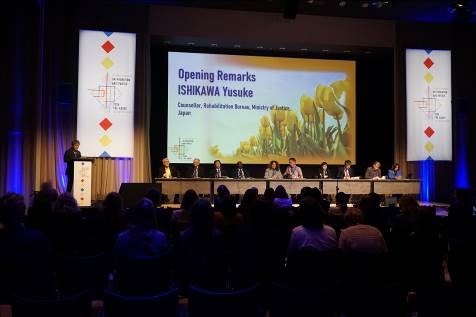
The Declaration on the International Day for Community Volunteers Supporting Offender Reintegration was endorsed by the participants of the 2nd WCCV and established the International Day on 17 April. The purpose of the Declaration is to disseminate the value and contribution of community volunteers in the offender rehabilitation and reintegration field, drawing on Japan’s hogoshi system, which was established in 1888, as a well-established practice.
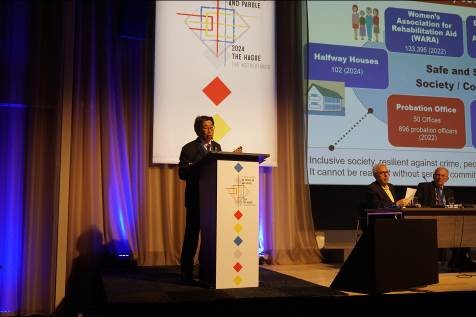
Hogoshi presents at a side event of the 33rd Commission on Crime Prevention and Criminal Justice (CCPCJ) in Vienna.
The 33rd CCPCJ was held at the Vienna International Center from 13 to 17 May 2024.
The Ministry of Justice held a side event there on 14 May, and Mr. ISHIZAKI Toshikazu shared his experiences as a hogoshi in order to help criminal justice practitioners and policymakers understand Japan’s practice of getting support from community volunteers in the offender rehabilitation field.
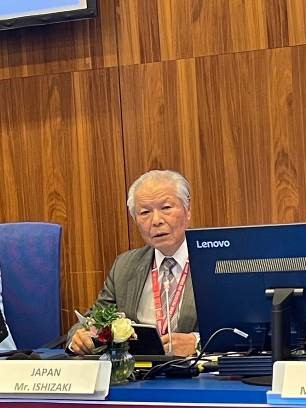
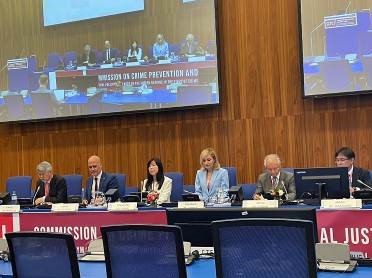

LINK
Community Volunteers Supporting Offender Reintegration around the World

